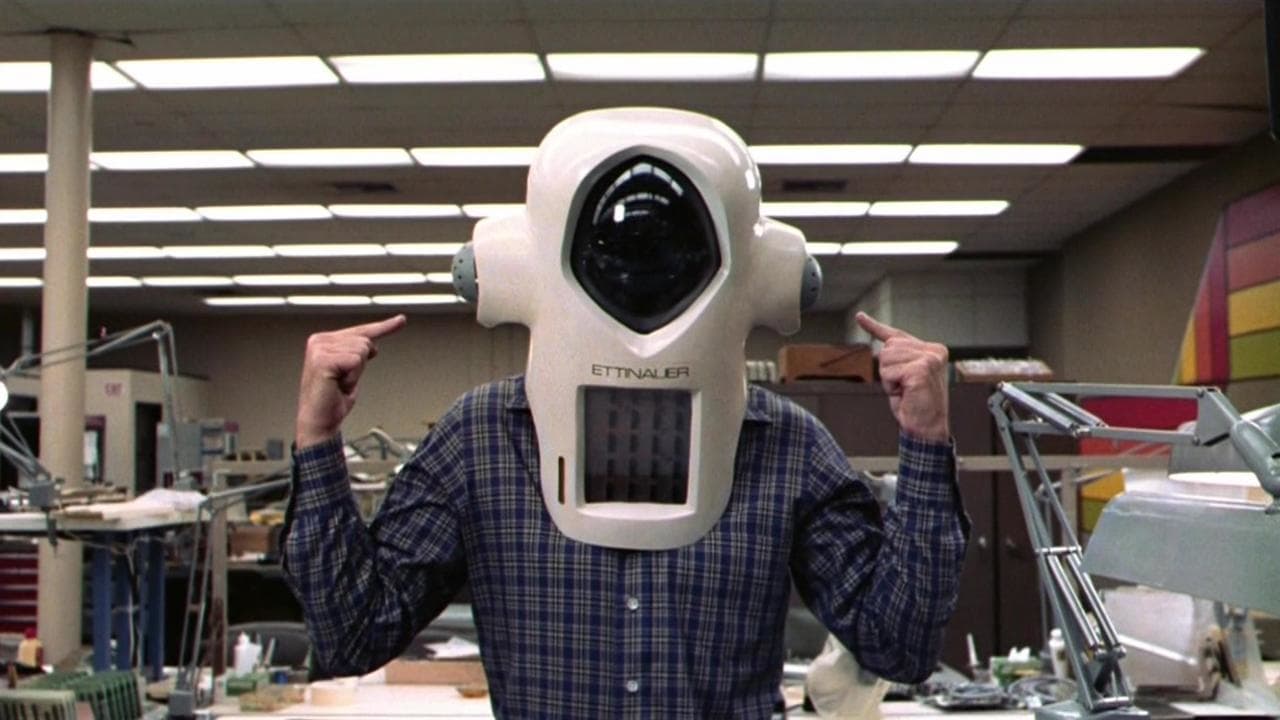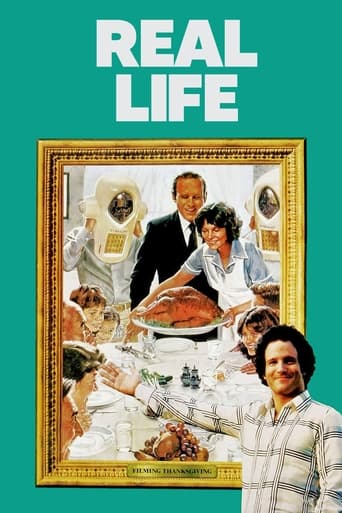

That was an excellent one.
... View MoreAbsolutely Fantastic
... View MoreThis is a coming of age storyline that you've seen in one form or another for decades. It takes a truly unique voice to make yet another one worth watching.
... View MoreIt’s fine. It's literally the definition of a fine movie. You’ve seen it before, you know every beat and outcome before the characters even do. Only question is how much escapism you’re looking for.
... View MoreThis is the directorial debut of comedian Albert Brooks, best known for voicing Marlin in Finding Nemo and Finding Dory, it was rated average by most critics, but it sounded like a really interesting concept, and it was featured in the book 1001 Movies You Must See Before You Die. Basically Albert Brooks (whose real name is Albert Einstein!) plays a darker version of himself, he has become a documentary filmmaker, his new cinematic and scientific experiment is a film that will capture every waking moment in the everyday life of an American family. Many families are auditioned, they are whittled down to two, until Brooks and his other producers settle on the ordinary Yeager family from Phoenix, Arizona: husband/father Warren Yeager (Charles Grodin), wife/mother Jeanette (Gremlins' Frances Lee McCain), and their children, Lisa (Lisa Urette) and Eric (Robert Stirrat). The concept is for the family to go about their business, at home, at work and at school as if nothing is different, ignoring the fact that men wearing cameras that look like Star Wars helmets are recording every move they make and every word they say. Brooks promises to be as unobtrusive as possible, taking a separate residence in the neighbourhood and not interfering, "for the good of the show". But the presence of the crew causes stress and complications for the family, and Brooks has unwittingly becoming the object of Mrs. Yeager's affections. Yeager is a vegetarian, he is traumatised being filmed when causing the death of a horse, and Jeanette is devastated by the death of a grandparent, tension is put on the leading couple, leading to "lifeless" material. There is a point when Mrs. Yeager is going for a medical examination, but she seems to have no reservations about allowing the film crew to capture it, this is course causes a lot of controversy. Brooks from Hollywood is unscrupulous and will do almost anything to make a more interesting film, including dressing as a clown to cheer them up. Brooks has a meeting with his fellow producers, and the two doctors evaluating the ongoing project, one of whom leaves, sighting that the project has lost control, and soon enough press start hounding the Yeagers. Brooks has a meeting with the institute, who are considering bringing the project to an end, Brooks tries to defend it, reminding them that it is supposed to last for an entire year. But the family also do not wish to be part of it any longer, despite pleas from Brooks, they will not change their minds to abandon the project. Brooks decides the only thing he can do to keep the show going is to set the house on fire, in a Gone with the Water style, joyfully exclaiming that it is a spectacular ending. Also starring Dick Haynes as Councilman Edmund Harris, Matthew Tobin as Dr. Howard Hill, J.A. Preston as Dr. Ted Cleary, Mort Lindsey, Joseph Schaffler as Paul Lowell - Realtor, Phyllis Quinn as Donna Stanley - Gift Shop Owner, James Ritz as Jack from Cincinnati and James L. Brooks as Driving Evaluator. This film is a spoof of the then popular docusoap An American Family, reality TV has now become a staple of television over the years, especially ones about families, e.g. The Osbournes, Wife Swap, Supernanny, The Family and Keeping Up with the Kardashians, so this film is much more relevant today, and it could almost be a premonition to the whole thing. It really does mock what goes on behind the scenes, the destructive influence that happens to the subjects, and the various attempts make an entertaining show, some turning into mishaps, a clever and amusing satirical comedy. Worth watching!
... View MoreThis film has one funny sight gag - the camera men with their high-tech (for its time) helmet cams prowling the Yeager and Brooks households like voyeuristic aliens. And that's it. Otherwise, it is a static, flat satire that goes nowhere. I'm amazed to read some other comments describing Brooks' first film as "complex." It's consistently dumb and obvious and desperate - the "perfect" family is actually dysfunctional, the black academic is a prig who resents being racially stereotyped, the Hollywood producer only cares about making money not art, a gynecologist is actually a baby trader who was ambushed by "60 Minutes" (sounds funnier than it plays) -- and so on. Ha ha. At nearly every turn, Brooks sucks the humor out of every potentially humorous situation. He doesn't know how to pace in the longer format and the film feels horribly padded, as well. I sat there stone-faced for a little over an hour and a half waiting for the humor to kick in, charitably chuckling here or there.Of course with the explosion of reality programming over the last decade, one would think that this film was ahead of its time. But Brooks botches it by focusing more on himself and the totally unfunny scientific institute. We don't even meet the Yeagers until about a half hour into the picture. There is absolutely no need for the scientific institute in the film, and Brooks should have remained OFF camera, goading and cajoling the Yeagers into being more "real" from behind the scenes. That might have been funny. But what we get is Brooks moving into the house next door (not funny) and expecting what? This is where the movie makes no sense. Does he want conflict or the "perfect family" being perfect? Because when he gets conflict, he seems dissatisfied, and the institute reacts with grave concern that jeopardizes the entire project. But isn't that the whole point? Why would the institute even become involved unless they wanted to study the ups and downs and everyday struggles of a typical American family? The whole concept is half-baked and hopelessly confused.This film makes so many poor choices. Why would the studio send the Yeagers on a two-week trip to Hawaii? It's not funny and serves no purpose. The film within the film is supposed to be about the film-makers' callous intrusion into the Yeagers' life, not their generosity. Generosity isn't funny. When the Yeagers return, Brooks opts to give them an hour to themselves. Again, how is this funny? He should be right on top of them from the first moment and never let up. He shouldn't live in the house across the street, he should live IN the Yeagers' house. Time after time, Brooks shys away from where the laugh is. When the documentary finally starts filming, the wife complains of menstrual cramps at the dinner table (not funny) which triggers an unfunny argument with husband Charles Grodin, and we see that reality is messy, unpleasant. Might have been funny or interesting if the film had built to that moment, showing the Yeagers gradually breaking down under the constant scrutiny of their lives. But it happens with no build-up, no tension, no funny.Strangely, Brooks seems bored with the Yeager family. They never come into focus, particularly the children. The young son is given nothing to do and barely registers. The daughter gets one junior-high-school-drama queen scene, then is forgotten. The wife flirts with Brooks early on (not funny) but that's quickly dropped. Why would the wife possibly invite Brooks to film her visit to a gynecologist? Not funny. Might have been funny if she had let it slip she had an appointment with the gynecologist and Brooks had tailed her there and surprised her at the office. And Grodin, a very funny actor, is completely wasted in the bland role of the bland father trying to maintain his bland image.Brooks ill-advisedly makes himself the star, and he just isn't at the top of his game here. His neurotic ramblings don't have much bite, his character isn't sharply enough written, and his goals never become clear. I should have been tipped off in the first scene. Brooks is schmaltzily introducing himself and the institute representatives to the town. The black academic is uncomfortable in this setting and doesn't stand up when introduced. Brooks jokes that if the audience is wondering why he didn't stand it's because he "doesn't eat much." Huh? Oh, I guess I just don't get that complex Brooks humor.
... View MoreAlbert Brooks tries so hard in this fake documentary about American family life that you find yourself willing to wade through the movie's many slow moments and gags that just don't succeed. Plus, the movie can be quite funny from time to time. But, in general, I look at this like a fake documentary that was a noble experiment that ultimately failed--but is still worth seeing. After all, if it hadn't been for films like this, maybe they never would have made films like BEST IN SHOW as well as AND GOD SPOKE.Although the purpose of this documentary is to show American family life in an unobtrusive manner, ultimately, the family becomes like a lot of modern "reality TV" families and the action becomes more and more suggested by the producer, Brooks. And, ultimately, the filming takes on a dramatic impact on the family.Funny, insightful but far from perfect.
... View MoreIn his directorial debut, Albert Brooks combines the broad but edgy satire developed in his short films on `Saturday Night Live' with the ruthless self-flagellation that would become his trademark and while it falls short of the genius that would explode in `Modern Romance' and `Lost In America', it's chock full of purpose. Brooks has a lot on his plate and wants to make sure he gets it all out in the open: his targets include documentary filmmaking, reality television (his prescience about today's programming is surprising), Hollywood and, not least of all, the role of the comedian as social critic in society. As a narcissistic comedian/filmmaker intruding into the lives of a hapless Phoenix nuclear family (the parents are Charles Grodin and Frances Lee McCain), Brooks immediately establishes a sophisticated filmic style that includes a mastery of long, uncomfortable takes and a shrewd sense of camera placement that keeps you tuned into the conceit of having lives recorded for fun and profit; that the conceit turns outrageously psychotic at the end only adds to the immaculate design. Unlike Woody Allen, whose unsightly condescension towards his audience is obvious and demeaning, Brooks respects his viewer's intelligence and rewards it with challenging material that's also accessible and funny.
... View More